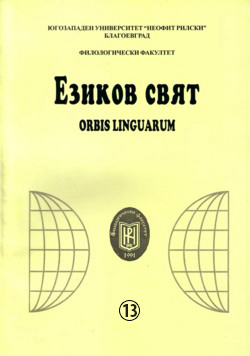
We kindly inform you that, as long as the subject affiliation of our 300.000+ articles is in progress, you might get unsufficient or no results on your third level or second level search. In this case, please broaden your search criteria.

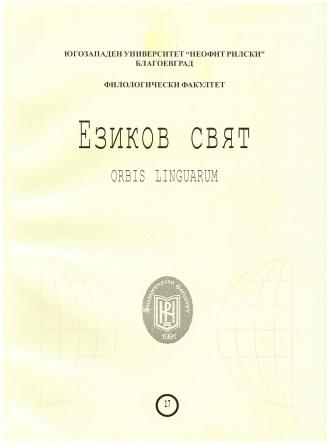
The paper presents a short contrastive analysis of phraseological units in the Bulgarian and the Polish language, which have Biblical origin. The text is focused on non-predicative expressions (i.e., it deals with semantic, formal and stylistic features of expressions with no verbal component) and observes their variation of the meaning following as a context their contribution in Bulgarian and Polish resources. In this respect, the first part of the article represents the similarities between Bulgarian and Polish Biblical Phraseological Units. The units under observation here are grouped in pairs, depending on the general element they contain. Mainly, that is an onomastic element with symbolic meaning and it is a kind of reference to the Old or New Testament. In the second part of the present text, Biblical expressions share one and the same symbolic element, but they have different semantics and structure. The compared constructions are based on different aspects of the symbol and they have different connotative potential. That part has a main function to highlight that both – Bulgarian and Polish language, using the same Biblical element could make completely different phraseological units. Despite the genetic relations of the two Slavic languages, the cited constructions are formed by Bulgarian and Polish cultural and religious experience.
More...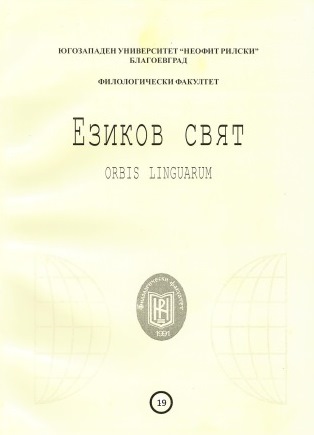
The research object of the present text is Polish, Slovakian, and Czech personal names derived from a name which is Latin by origin and denotes a plant. The main aim is to present their full list as well as their initial meaning. Specialized anthroponymic dictionaries are used as the main source of information for excerpting the researched anthroponyms. All of them contain information not only about the different name forms, but also about their etymology, origin, and canonization. The researched anthroponyms are divided into three major groups according to: 1) the meaning of the appellative (i. e. a thematic classification); 2) the type of the basic word (i. e. if the researched anthroponym is derived directly from an appellative or via another anthroponym (in this case a Roman gentile name or a Neolatin name)); 3) their canonization. All personal names included in this research are a part of the modern Polish, Slovakian, and Czech anthroponymicons, even though they represent a small group with relatively infrequent usage, the initial meaning of which is not completely clear to everybody nowadays. That is why it is of great importance to reveal the basic appellative.
More...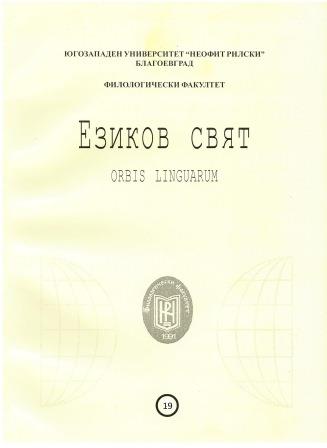
The present paper is contrastive analysis of Bulgarian, Polish and Lithuanian phraseological units containing a color term naming black or white. It traces the way these components reflect the figurative meaning of the unit - through their color semantics or through their function as a cultural signs. The study classiffiеs Bulgarian, Polish and Lithuanian expressions as to their belongings to several groups, which refer to different concepts. In each group the comparison of the examples found in the three phraseological subsystems is based on their semantics, their lexical components and structure. Under observations are substantive, adjectival, adverbial and verbal phraseological units where the colors are used only as an adjective component. The analysis takes into consideration that black has negative symbolism and cultural connotations. Thus the phraseological units with black are linked mainly to the concepts such as death, sorrow, bad life, misfortune. The text suggests that color term for black is rarely used to express neutral or positive meanings. The white has a positive cultural connotation associated to whiteness, light, good life, goodness, but its meaning can vary to neutral or negative in phraseological system of the three languages. The present paper observes similarities of collected phraseological expressions and emphasizes their nation-specific features.
More...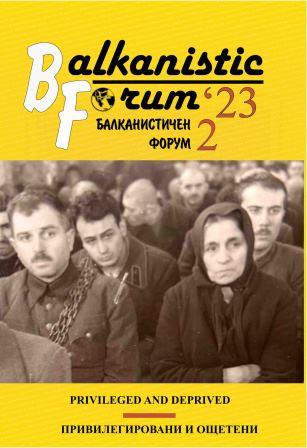
The change in social and political conditions in Czechoslovakia and then in inde-pendent Czechia after 1989 caused significant dynamics in the creation of new words and expressions or the expansion of the meaning of already existing words. A symbolic representative of the emergence of new words and meanings is the verb tunelovat and its derivatives (tunelování, tunelář, etc.), which began to be used to describe a certain way of realizing economic crime, through which privileged individuals from the time of the communist totalitarian regime become a privileged layer of society and in the new conditions of freedom thanks to their connections, financial security from the past and their entrepreneurial cynicism. The article presents a linguistic analysis of this expression and its derivatives from the point of view of lexical semantics, word for-mation and frequency of use. The analysis is based on both the relevant scientific lit-erature and data from the Czech National Corpus.
More...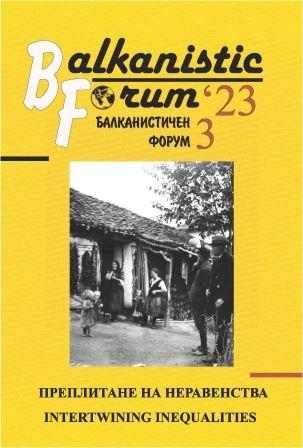
The article presents a study of the ways of presentation of one hundred names for professions, positions, ranks, etc. in the nomenclature list for professions in the Republic of Bulgaria, and then in the Dictionary of the Bulgarian Language (DBL) and The Great Dictionary of the Polish Language (Wielki słownik języka polskiego - WSJP), which strongly influence the editors' preferences and choice of masculinisms or feminisms in traditional and web-based media and encyclopedic products. The comparison between the Polish and Bulgarian dictionaries is carried out according to four criteria in order to establish the degree of asymmetry in the presentation of feminine and masculine forms.
More...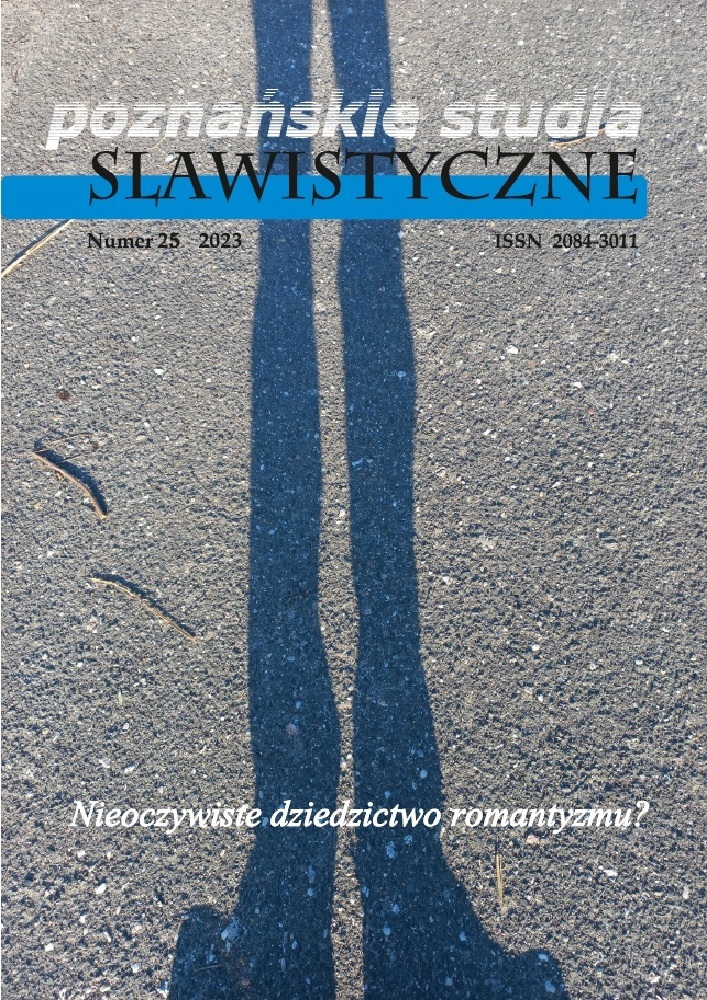
In 1853, Karel Jaromír Erben published a collection of ballads Kytice, which was immediately seen as a model of national literature. The contact of this model with Romanticism is only selective, because it does not consider all the metaphysical dilemmas resulting from the appreciation of the individualistic attitude to the world. It might seem that Kytice should share the fate of other 19th century texts of culture which are currently attributed the position of a respectable, old fashioned literary monument. Meanwhile, in recent years, two novels have been published directly drawing inspiration and thematic material from the life of the poet, namely: Vřeteno osudu. Tajná zpověď by Karel Jaromír Erben by Otomar Dvořák (2015) and Stará škola by Petr K. Procházka (2022). Both literary biographies expose the close, though hidden, connections between Erben’s poetics and worldview with the Romantic aesthetic and ideological context.
More...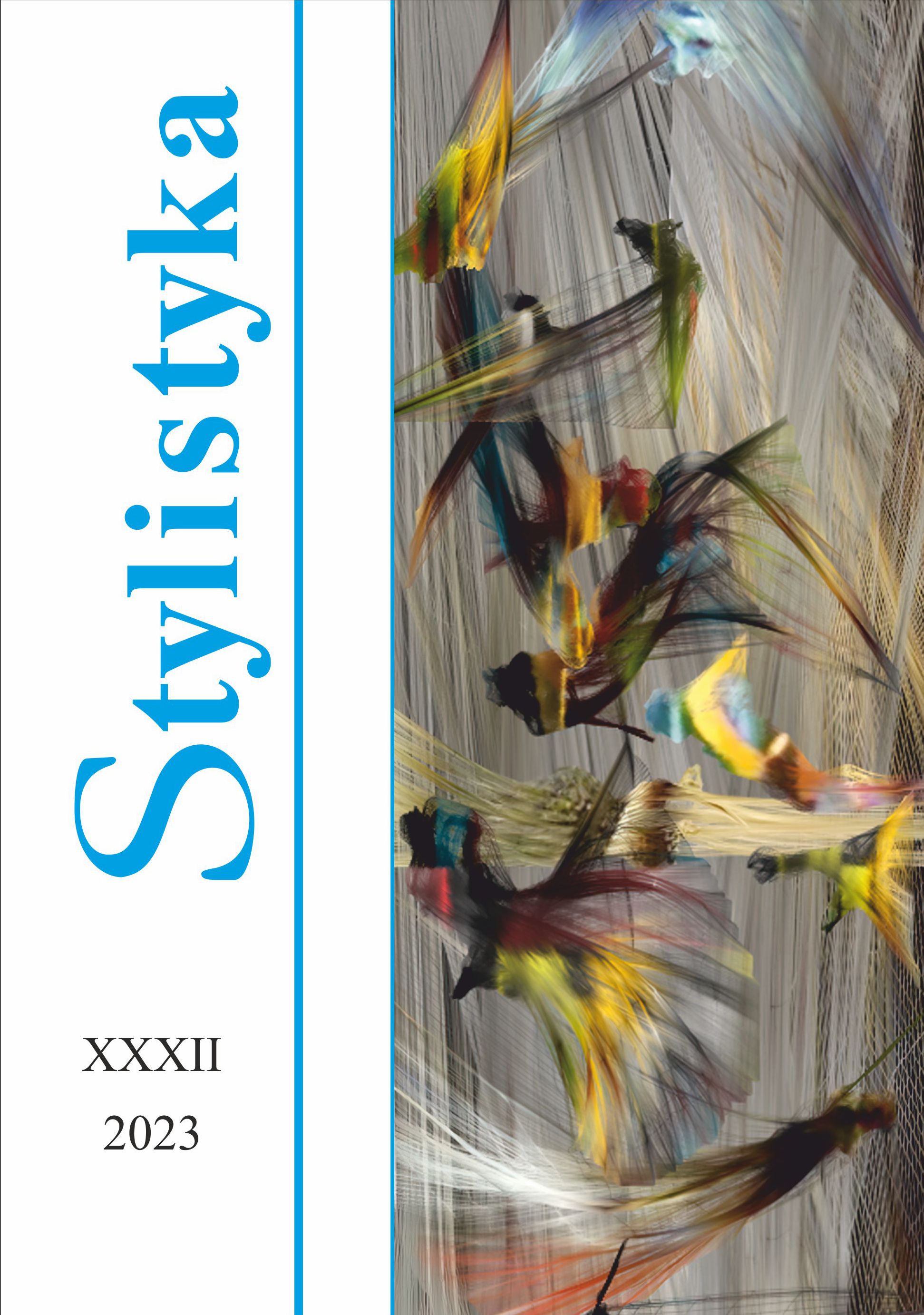
The article as a research reconnaissance contains an analysis of the language and style of Andrzej Saramonowicz’s novel Pokraj. The author discusses selected determinants of the original language of the novel, e.g., vocabulary, metaphors, comparisons, and significant proper names. Much attention was paid to intertextual references, such as the imitation of clearly recognisable forms (drama, film script, radio news, religious texts), recalling texts related to a common theme in the form of a collage and the use of quotes and paraphrases, the accurate reading of which depends on the cultural competence of the readers. The presented analyses show the author’s procedures that build a specific humour, serve criticism, parody, and satire.
More...
This article is a first comprehensive monographic study of the topical comparison to the Trojan horse, discussing its origins and its most important panegyric uses in Old Polish orations and poetry. Today, when the phraseologism ‘Trojan horse’, associated with treachery, false gift, or internal enemy, is unambiguously pejorative, the positive connotations of 16th- and 17th-century texts may seem incomprehensible. Meanwhile, old authors commonly imitated Cicero’s formula (De oratore II 22,94), who likened the school of the famous speaker Isocrates to the Trojan horse, from whence many illustrious Greeks emerged. The numerous examples collected in the article prove that this comparison was commonly used in Polish literature until the end of the 18th century in three main contexts, i.e., to praise a humanist and teacher (e.g., professor of the Krakow Academy Szymon Kociołek, the bishop of Kraków Samuel Maciejowski), to praise a university (e.g., the Kraków Academy) or school (e.g., Jesuit colleges), and to praise an illustrious family (originally royal, princely and magnate families, with time the comparison began to be used in praise of minor noble families). The article also discusses the obscene reinterpretation of this topos.
More...
Wieść o śmierci profesora Stanisława Gajdy szybko obiegła środowiska akademickie w Polsce i za granicą, napełniwszy smutkiem licznych przedstawicieli nauki – nie tylko językoznawców. Dzięki swojej wieloaspektowej działalności i postawie życiowej opolski lingwista był bowiem znany szerokiemu gronu naukowców. Zamknęło się życie uczonego o niekwestionowanym autorytecie, dla wielu mistrza, dla innych mentora, ale też dobrego kolegi i przyjaciela. O szacunku dla mistrza świadczy choćby styl zredagowania jubileuszowego biogramu przez Jolantę Nocoń (2016: 11–13), a sylwetkę wybitnego badacza, organizatora życia naukowego i przede wszystkim przyjaciela kreśli we wspomnieniu Stanisław Dubisz (2023: 7–11).
More...
This article presents the usages of Polish epistemic particles in the material of textbooks for learners of Polish as a foreign language at levels A1 and A2. The goal of the research was to identify the units and analyse meanings, as well as typical context and functions of the particles. The usages of the particles pewnie, chyba, może, na pewno, oczywiście, and naprawdę were confronted with their meanings specified in dictionaries. The analysis demonstrates lack of exercises teaching their usages and explanations of the meaning of the particles in the textbooks.
More...
This paper addresses the spelling of the Czech terms sémantickosyntaktický ‘semantic-syntactic’ and formálněsyntaktický ‘formal-syntactic’ against the background of the development of syntactic description in Czech and consists of two parts. (1) The term syntaktickosémantický in syntactic semantics of a simple sentence, which emerged as a scientific discipline only after lexical semantics, is dealt with. This branch of linguistics employs the term formálněsyntaktický for constituent dependence in simple sentences and for denoting (formal-syntactic) relationships called hypotaxis and parataxis in complex sentences. (2) In the description of complex sentences proposed by Štěpán (2013b), the term formálněsyntaktický (from formální syntax) is used to describe the behaviour of subordinators and coordinators, and the term sémantickosyntaktický (from sémantická syntax) for relationships of determination, coordination, parenthesis, apposition, and comparison. In these compound adjectives, their components are written together in Czech without a hyphen in accordance with spelling rules.
More...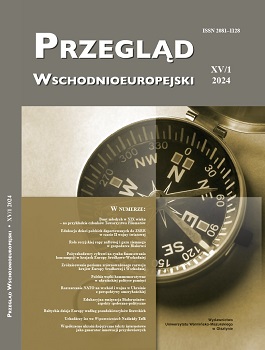
Fifty-one entries (with the letter M) in the Russian-Polish dictionary of 1877 which were assigned a discussion of the meaning instead of a real translation, e.g. муссон – wjatr periodyczny [a periodic wind], were examined. These were limited to borrowed Russian units which today correspond to Polish borrowed units, e.g. муссон – monsun [monsoon]. The Polish words are the object of the analysis. In order to discover the reason for their omission from the dictionary, evidence of their use in the corpus of historical texts was sought. It was found that 80% of the borrowings (41 units) occurred in texts before 1876, but some of them were not recorded in the dictionaries of the time and perhaps that is why they did not find their way into the translation dictionary. 20% of the material (10 units) is lexis that entered circulation after the dictionary was published.
More...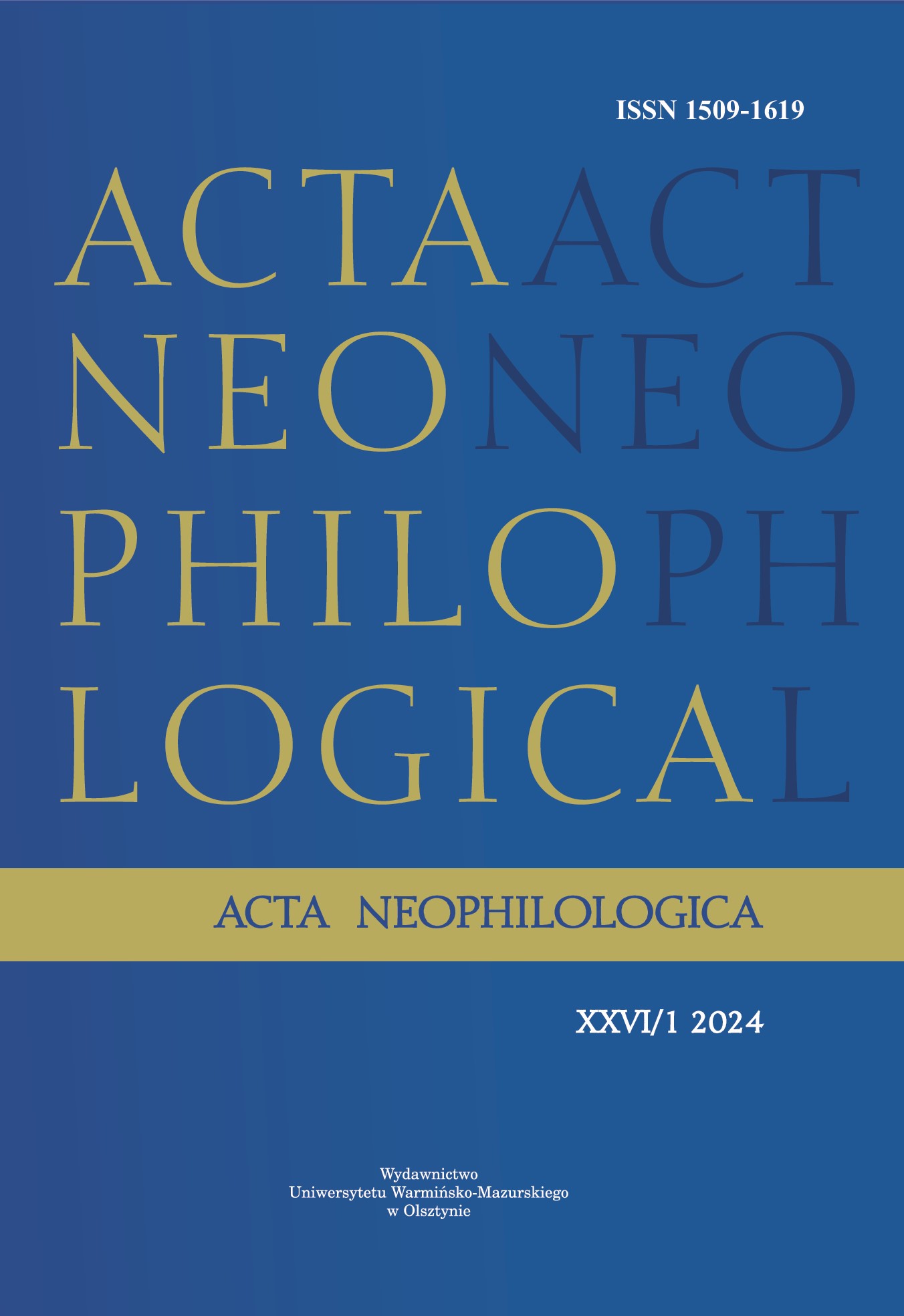
This article deals with the neologisms of Anglo-American provenance which refer semantically to ecology. The source of the excerpted factual material is Polish and Russianlanguage glossy lifestyle magazines. The presence of “ecological anglicisms” in the discourse analyzed testifies to the pragmatic need to unify the communication of different nations in the field of global environmental protection, and may be due, among other factors, to psychological reasons, such as the fashion of using English, or the need to promote the ideological solidarity of societies towards “Mother Nature”. The aim of the analysis is to determine the specificities of the collected units in terms of their conceptual domains and other formal characteristics. The examination of the material shows that some characteristics are visible in it, e. g. the dominance of units with meliorative colours, the high prevalence of “ecological anglicisms” in the form of citations, the internationality of loanwords, etc.
More...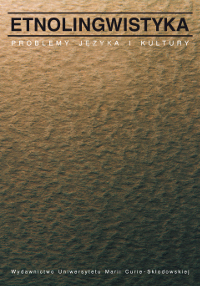
W artykule został omówiony etnolingwistyczny aspekt działalności Jana Karłowicza. Badacz ten jest znany przede wszystkim jako redaktor i autor trzech słowników oraz redaktor czasopisma „Wisła”. Stricte etnolingwistyczną pracą Karłowicza jest odnaleziony w 2017 roku Słownik mitologii polskiej, który wpisuje się w nurt etnolingwistyki historycznej, specyficznie rozumianej. Również terminowi mitologia zostało przypisane inne znaczenie od współczesnego: ‘całokształt życia ludzkiego odzwierciedlony w folklorze, wierzeniach i zwyczajach, zarówno przedchrześcijańskich, jak i katolickich’. Autor, wychodząc z założenia, że lud stanowi stadium ewolucyjne narodu pierwotniejsze niż szlachta czy mieszczaństwo, był przekonany, iż badania porównawcze tzw. przeżytków wskażą to, co dawne w polskiej mitologii. Celem takich badań było pokazanie złożoności polskiego widzenia świata i człowieka na tle ogólnosłowiańskim, a nawet znacznie szerszym.
More...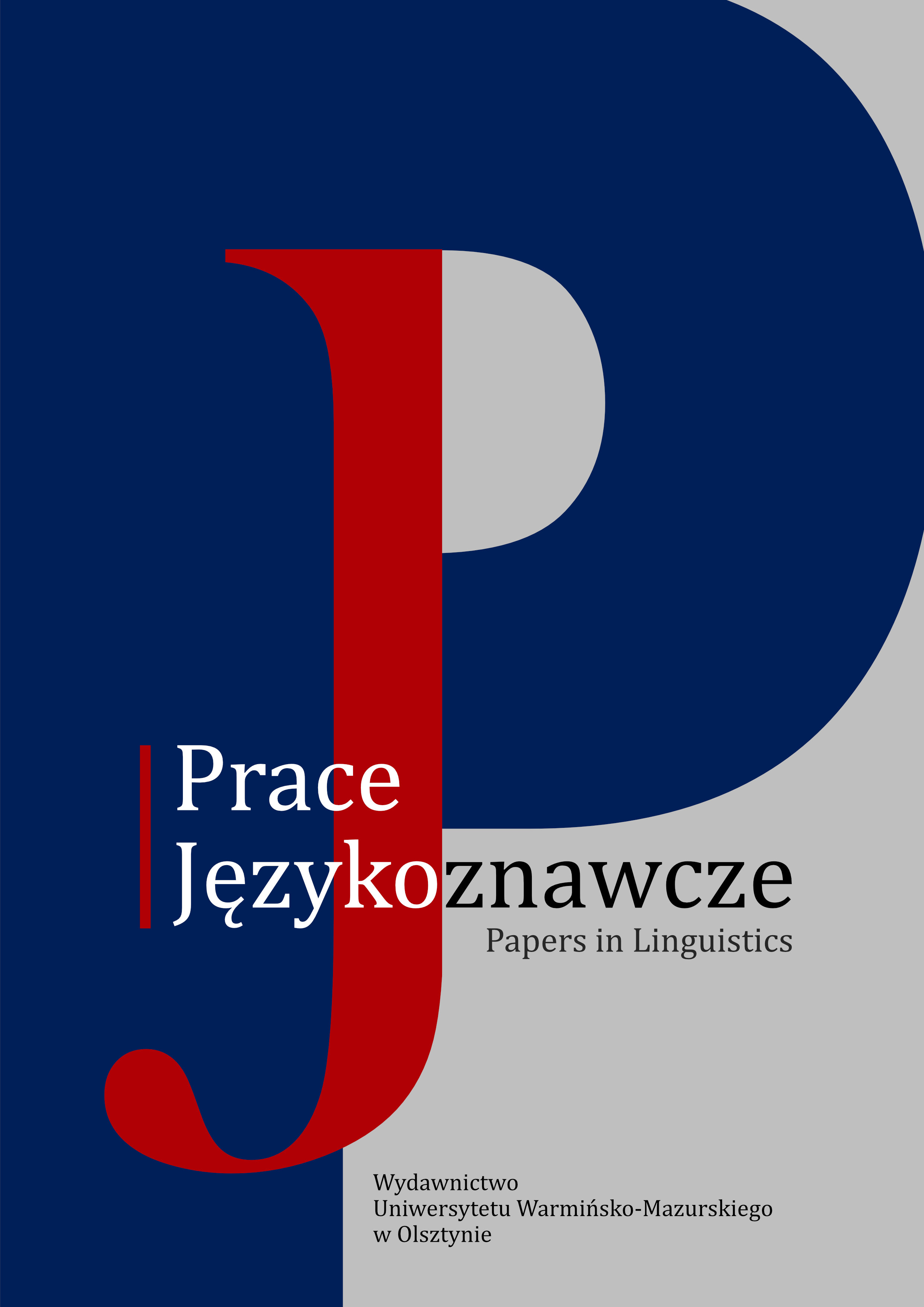
The article is concerned with proper names in selected poems by Julian Tuwim. The poet’s achievements are discussed in many studies, especially in literary ones. Researchers (e.g. Michał Głowiński, Ryszard Matuszewski) investigated the most important aspects of his poetry and the features of its poetics. They also paid attention to the linguistic aspect of Tuwim’s writing, but they were not much interested in the onymic layer of his poems. Meanwhile, Tuwim’s poetry is the source of a rich collection of proper names, appearing on their own or constituting elements of metaphors and similes. The article discusses selected names from the perspective of their functionality, considering also the usefulness of research tools of literary onomastics in the interpretation of onomastics in poetic textsproper names; literary onomastics
More...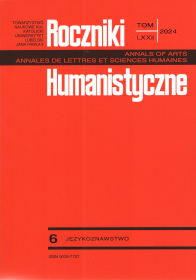
The aim of the article is to describe and compare the linguistic and communication characteristics of the three most general names of “video games” in Polish. The main sources of data were dictionaries of Polish, the National Corpus of the Polish Language, and messages from specialized media dealing with video games. The research has shown that the analyzed units differ in word-formation and real meaning, semantic connectivity, frequency of occurrence in the discourse and social range.
More...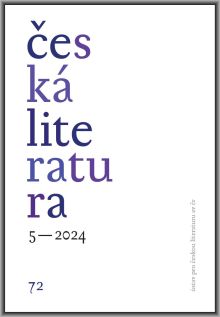
This article contains a collection of contributions on Czech bibliography, conference reports, etc.: 1. Ex nihilo nihil fit. Remembering Josef Zumr (19.3.1928 — 2.7.2024) 2. Report on the international interdisciplinary Krakow conference 3. Fifteenth textological colloquium (slightly different this time) 4. Legacy of the discipline: Šmilauer — Hausenblas — Stich 2023 5. The search for the Slavic national epic in the Interpretive network of European Romantic nationalism 6. Informatorium
More...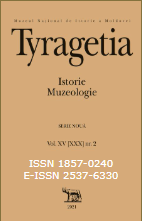
The article examines medieval court books written in 1386-1500. They included files examined by territorial courts, which represented the state noble court. 90 manuscripts have been preserved from this period. They are Latin-Polish monuments, in which Latin predominates. The books contain very rich linguistic and historical material. Based on them, we can observe how the process of forming Polish orthography proceeded, which consisted in adapting the Latin alphabet to the phonetic needs of the Polish language. The unusual abundance of onomastic material allows us to trace the formation of the binomial naming system of people, which was a long and complicated process. The very rich and diverse legal vocabulary contained here reflects the penetration of Latin terminology (derived from Roman ius civile) into Polish legal vocabulary and illustrates the formation of statutory law in Poland. The Latin-Polish character of the books shows the correlation of these languages. Often the content expressed in Latin was written in Polish. Polish words were inserted into Latin sentences or Polish sentences ended in Latin. The court books are still not fully completed, even though they contain the largest collection of lexicon from the late 14th - 15th centuries. In order for all the materials to become accessible to a wider group of researchers, their highly authoritative editing is necessary.
More...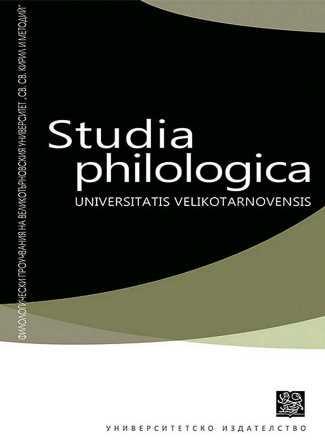
This paper aims to present the modelling process and models of Turiec River hydronymy. Turiec is a river in northern Slovakia. The term A1 model is used to denote a model mapping the content aspect of a hydronym. It contains a functional member with a semantic attribute signalling the type of onymic relation and functional members expressing other semantic attributes. Hydronymic models are categorized according to the number of functional members into one-membered, two-membered, and three-membered models. Two-membered models are most frequent, especially models expressing a relation to a place and describing a specific feature. Models using flora and fauna for honorification purposes also occur. The presented types of models, categorized according to the number of functional members and to the identified semantic characteristics of functional members, co-create the paradigm of hydronymic modelling.
More...